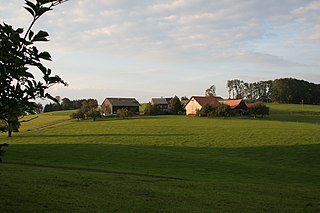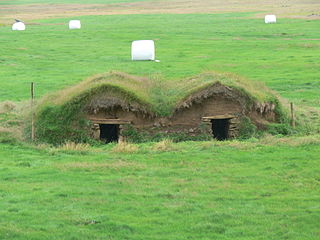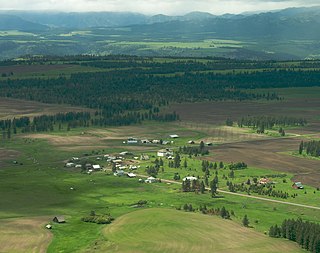Related Research Articles

The Act of Settlement is an act of the Parliament of England that settled the succession to the English and Irish crowns to only Protestants, which passed in 1701. More specifically, anyone who became a Roman Catholic, or who married one, became disqualified to inherit the throne. This had the effect of deposing the remaining descendants of Charles I, other than his Protestant granddaughter Anne, as the next Protestant in line to the throne was Sophia of Hanover. Born into the House of Wittelsbach, she was a granddaughter of James VI and I from his most junior surviving line, with the crowns descending only to her non-Catholic heirs. Sophia died less than two months before Queen Anne, and Sophia's son succeeded to the throne as King George I, starting the Hanoverian dynasty in Britain.

Hull House was a settlement house in Chicago, Illinois, that was co-founded in 1889 by Jane Addams and Ellen Gates Starr. Located on the Near West Side of Chicago, Hull House, named after the original house's first owner Charles Jerald Hull, opened to serve recently arrived European immigrants. By 1911, Hull House had expanded to 13 buildings. In 1912, the Hull House complex was completed with the addition of a summer camp, the Bowen Country Club. With its innovative social, educational, and artistic programs, Hull House became the standard bearer for the movement; by 1920, it grew to approximately 500 settlement houses nationally.

A hamlet is a human settlement that is smaller than a town or village. This is often simply an informal description of a smaller settlement or possibly a subdivision or satellite entity to a larger settlement. Sometimes a hamlet is defined for official or administrative purposes.

The Henry Street Settlement is a not-for-profit social service agency in the Lower East Side neighborhood of Manhattan, New York City that provides social services, arts programs and health care services to New Yorkers of all ages. It was founded under the name Nurses' Settlement in 1893 by progressive reformer and nurse Lillian Wald.
Executive departments are the largest component of the executive branch of the government of the Philippines. These departments comprise the largest part of the country's bureaucracy.
In banking and finance, clearing refers to all activities from the time a commitment is made for a transaction until it is settled. This process turns the promise of payment into the actual movement of money from one account to another. Clearing houses were formed to facilitate such transactions among banks.

Alibunar is a town and municipality located in the South Banat District of the autonomous province of Vojvodina, Serbia. Alibunar town and Alibunar municipality have a population of 2,883 and 19,780 respectively.
The settlement movement was a reformist social movement that began in the 1880s and peaked around the 1920s in the United Kingdom and the United States. Its goal was to bring the rich and the poor of society together in both physical proximity and social connection. Its main object was the establishment of "settlement houses" in poor urban areas, in which volunteer middle-class "settlement workers" would live, hoping to share knowledge and culture with, and alleviate the poverty of, their low-income neighbors. The settlement houses provided services such as daycare, English classes, and healthcare to improve the lives of the poor in these areas. The settlement movement also spawned educational/reform movements. Both in the UK and the US settlement workers worked to develop a unique activist form of sociology known as Settlement Sociology. This science of social reform movement is neglected in the history of sociology in favor of a teaching-, theory- and research university–based model.

Opovo is a town and municipality located in the South Banat District of the autonomous province of Vojvodina, Serbia. The town has a population of 4,546, while Opovo municipality has 10,475 inhabitants.
A payment system is any system used to settle financial transactions through the transfer of monetary value. This includes the institutions, payment instruments such as payment cards, people, rules, procedures, standards, and technologies that make its exchange possible. A payment system is an operational network which links bank accounts and provides for monetary exchange using bank deposits. Some payment systems also include credit mechanisms, which are essentially a different aspect of payment.

The sod house or soddy was an often used alternative to the log cabin during frontier settlement of the Great Plains of Canada and the United States in the 1800s and early 1900s. Primarily used at first for animal shelters, corrals, and fences, if the prairie lacked standard building materials such as wood or stone, sod from thickly-rooted prairie grass was abundant, free, and could be used for house construction. Prairie grass has a much thicker, tougher root structure than a modern lawn.

The Mary Ward Centre is an adult education college in Stratford, London.

In geography, statistics and archaeology, a settlement, locality or populated place is a community of people living in a particular place. The complexity of a settlement can range from a minuscule number of dwellings grouped together to the largest of cities with surrounding urbanized areas. Settlements include hamlets, villages, towns and cities. A settlement may have known historical properties such as the date or era in which it was first settled, or first settled by particular people. The process of settlement involves human migration.

A homestead is an isolated dwelling, especially a farmhouse, and adjacent outbuildings, typically on a large agricultural holding such as a ranch or station.

Črna Vas is a settlement on the right bank of the Ljubljanica River, south of the capital Ljubljana in central Slovenia. It belongs to the City Municipality of Ljubljana. It is part of the traditional region of Lower Carniola and is now included with the rest of the municipality in the Central Slovenia Statistical Region.

Newfoundland was an English and, later, British colony established in 1610 on the island of Newfoundland, now the province of Newfoundland and Labrador. That followed decades of sporadic English settlement on the island, which was at first seasonal, rather than permanent. It was made a Crown colony in 1824 and a dominion in 1907. Its economy collapsed during the Great Depression and on 16 February 1934, the Newfoundland legislature agreed to the creation of a six-member Commission of Government to govern the country. In 1949, the country voted to join Canada as the province of Newfoundland.

Prehistoric pile dwellings around the Alps are a series of prehistoric pile dwelling settlements in and around the Alps built from about 5000 to 500 BC on the edges of lakes, rivers or wetlands. In 2011, 111 sites located variously in Switzerland (56), Italy (19), Germany (18), France (11), Austria (5) and Slovenia (2) were added to the UNESCO World Heritage Site list. In Slovenia, these were the first World Heritage Sites to be listed for their cultural value.

Karakabaklı is an archaeological site in Mersin Province, Turkey.
Machwene Rosina Semenya is a South African politician who served as the Chairperson of the Portfolio Committee on Human Settlements till 2024. A member of the African National Congress, she had previously served as the Chairperson of the Portfolio Committee on Agriculture, Forestry and Fisheries from 2014 to 2019 and as the Chairperson of the Portfolio Committee on Human Settlements, Water and Sanitation from 2019 to 2021. Semenya was a Member of Parliament till 2024.